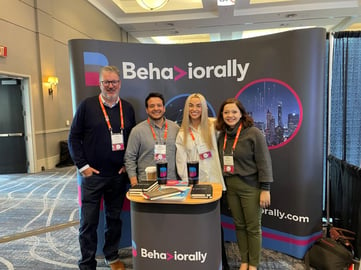 The Quirk’s conference has returned to the West Coast, which was perfect as we have just launched our new Los Angeles hub earlier in the month! Held last week on February 22-23 in LA, we were happy to join other insights professionals to discuss the latest trends and challenges within our industry. There were 3 themes that we saw emerge from the event:
The Quirk’s conference has returned to the West Coast, which was perfect as we have just launched our new Los Angeles hub earlier in the month! Held last week on February 22-23 in LA, we were happy to join other insights professionals to discuss the latest trends and challenges within our industry. There were 3 themes that we saw emerge from the event:
Everybody’s Talking About AI
Numerous presentations focused on unveiling the power of artificial intelligence (AI) and how it is impacting the industry. In one session, Sonos utilized AI to better analyze and parse through customer feedback, message boards, and social media to identify why consumer’s devices had fallen silent. AI revealed that consumers saw the setup of the device and troubleshooting as too complicated, which led to Sonos creating a more informed educational journey to help get ahead of these issues before they arise. Fandango has been using AI to tap into unstructured feedback in their verbatims to gain better insights and make their research more respondent driven. This has led to fewer closed-ended questions, which means shorter questionnaires and higher completion rates.
It’s been fascinating to see how AI is revolutionizing how we do business and collect consumer data. We have even seen these changes here at Behaviorally with the launch of Flash.AI, Flash.PDP, PackPower Score, and other products where we utilize AI together with our industry-leading behavioral database to help our clients own the most valuable moment in marketing: the sales transaction.
But What About Data Quality?
However, there were also discussions about how AI (in particular, ChatGPT) is a threat to data quality for the insights professional. ChatGPT is a text-based AI system that understands natural language and generates human-like responses to a wide range of questions and prompts. It has become an incredibly powerful tool with a wide array of useful applications that are completely transforming our industry. However, it is becoming harder to distinguish people from machine. This poses a threat to the data quality of open ends. Some suggestions for our industry to help detect and mitigate these risks include:
- Consider how you frame the question. If a question is framed in a way that requires the answerer to provide a human experience, ChatGPT will be forced to identify itself as an AI system.
- Check for bulleted lists. ChatGPT will always provide lists either in bullets or numbers to questions that require a multi-level answer.
- Check for long answers. ChatGPT averages 221 words whereas real respondents average less than 30 words typically.
- Check for grammar and spelling issues. ChatGPT does not make any spelling or grammar mistakes. (Just proving that this blog post was in fact, written by a real human – hi!)
- Use irony. ChatGPT cannot interpret irony.
- Implement technical forms like tracking when a respondent uses copy and paste functions from other sites into surveys.
Improving data quality and preventing fraudulent participation in studies will be a never-ending effort for the industry. This is why it is important to keep pace with how these new technologies and innovations are being utilized and having trusted partners who keep on top of these trends is critical.
What’s Next and Getting Stakeholders to be Involved
As insights professionals, we are always looking at what’s next. Quirk’s LA was no different with numerous sessions around Gen Z and TikTok. Many brands are beginning to target Gen Z as a significant consumer demographic, who are shopping on different platforms than traditional eCommerce sites (e.g., TikTok). Understanding these trends will help marketers know how to properly target these consumers, stay ahead of other emerging trends, generate creative ideas, and identify unique opportunities to market to these shoppers.
Another future trend is the Metaverse. Warner Brothers Studios conducted research to understand what users thought the Metaverse meant and how best to deliver compelling content. In the end, Warner Brothers even hosted a BTS concert within the Metaverse. (Speaking of, click here to check out Behaviorally’s Metaverse art gallery and our We Better Behave! Sustainability event we hosted in the Metaverse.)
Another common theme throughout the sessions was making sure that the stakeholders buy into research as it ensures that the research is actually put to use. For insights professionals, the goal is to get the brand to make better decisions based on data-driven insights. But if stakeholders don’t understand or value that research, it is unlikely that it will be put into action. In a time when a recession may be looming, brands need to be ahead of the curve to be able to influence their consumers to choose them over the competition. Microsoft’s session advised on what it takes for a vendor to build trust and become a true partner. It is important to focus on data quality, land the insights, be on the lookout for the next big thing, offer foresight, be flexible, and provide expertise.
THE AUTHORS

Simon Wyld is the Senior Vice President out of Behaviorally’s Los Angeles hub working with the Customer Success team. Simon has a strong passion for designing and implementing behavioral science-based market research solutions with a strong focus on the tech sector. Originally from England, he now lives in LA with his wife, twin kids, and pup. On weekends, you can catch Simon golfing!
Click here to connect with Simon on LinkedIn.
 Danny Rodriguez is a Director at Behaviorally’s Los Angeles hub on the Customer Success team. Danny also has an extensive research background rooted in the behavioral sciences, serving some of the biggest tech brands located on the West Coast. He lives in LA with his wife and two pups. In his downtime, Danny plays guitar, travels, and is a foodie – ask him for restaurant recommendations!
Danny Rodriguez is a Director at Behaviorally’s Los Angeles hub on the Customer Success team. Danny also has an extensive research background rooted in the behavioral sciences, serving some of the biggest tech brands located on the West Coast. He lives in LA with his wife and two pups. In his downtime, Danny plays guitar, travels, and is a foodie – ask him for restaurant recommendations!
Click here to connect with Danny on LinkedIn.
